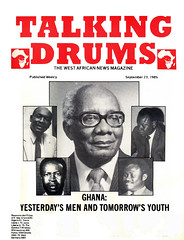Babangida and his neighbours
by Kofi Andoh
Nigeria has a lot of fence-mending to do with her immediate neighbours and those as far away as Ghana and Upper Volta after the spate of expulsions of illegal immigrants. Is Babangida ready to undertake this task?West African politics and inter-state relations seem to be the philosopher's perfect paradise - nothing appears quite permanent, except the permanence of the whirlpool of unpredictable changes. And quite often than not, relations among the countries in the sub-region have been shaped and largely determined by the kind of leadership in the various countries and in Nigeria in particular.
Quite recently a new feature appeared in the region's ever changing political leaderships in the form of Major-General Ibrahim Babangida, Nigeria's new military leader. For the moment there is euphoria everywhere. To those who were brutalised by Buhari, Babangida comes as an answer to prayer. To the overthrown leaders though, their attitude and mood are of apprehension and uncertainty. To Nigeria's immediate neighbours and other countries in the West African sub-region, their attitude is one of let's wait-and-see.
It is from the cheerless feature of Nigeria's relations with its neighbours that Babangida's palace coup acquires its significance. The history of the relations has been as chequered as the vast array of the regimes that have ruled in the various countries.
During Nigeria's first republic its relations with its neighbours was underlined by a feeling of mutual suspicion and jealousy resulting largely from differences in the attitudes and styles of the governing elites. Balewa's functional approach to the African independence struggle laid Nigeria open to accusations of betrayal. It played no significant role in the affairs of the sub-region and except its influence in the Monrovia group (which exerted much influence in the drafting of the OAU charter), the country held jealously to its image of a sleeping giant.
It is ironic that Nigeria's foreign policy and relations with its neighbours and other African states in general have fared better under military regimes. The mid-sixties witnessed the entry of the military into the politics of the sub-region; the enthronement of military governments in Niger, Benin Republic (then Dahomey), Togo, Ghana and Mali, to mention a few, ushered in a new era of improved relations, which laid the foundation for the formation of an economic union to function in the direction of regional integration.
The obvious explanation for this thaw in the otherwise cold relations was the existence of a common bond among the new leaders - professional camaraderie. This was helped by the lack, or absence, of any discernible ideological differences among the leaders, Gen. Yakubu Gowon did much to ensure cordiality, trust and tolerance replaced the fear, jealousy and mistrust that had been allowed to dominate relations in the sub-region. It was largely through his efforts that the Economic Community of West African States was born.
In view of the historic ties among states in the sub-region, the course of inter-state relations need not be as tortuous as it has been. The main underlying cause has been psychological - fear of infection of each other.
Alhaji Shehu Shagari's regime unwittingly revived all the known animosities that had characterised Nigeria's relations with its neighbours. The regime's patronising attitude, its big-brother image did much harm. Furthermore, the Chad border skir- mishes, the Cameroonian confrontation and the 1981 expulsion of illegal immigrants did not help matters either.
Indeed, in retrospect, ECOWAS did not make much progress in the path of economic integration, and except for fire-eating resolutions which all ended in pending trays, it was an effort trying to keep pace with the trend of Nigeria's relations with its neighbours. The relations dived to an all-time low when deposed Buhari carried out another expulsion of illegal immigrants this year.
In view of the historic ties among states in the sub-region, the course of inter-state relations need not be as tortuous as it has been. The main underlying cause has been psychologi- cal fear of infection of each other, and suspicion of Nigeria. But for countries living out the demands and needs of their independent corporate lives, one expects that maturity and statesmanship would sooner than later create the necessary emotional distance required in sustaining a healthy relationship.
The attainment of the ideals and goals of regional economic integration depends much on a spirit of give-and- take. This is because of the disparities in the orientation and goals of member-states. Nigeria's complaints have always been alien infiltration and influx. This has blunted the country's urge to push through the political and economic reforms envisaged under the ECOWAS provisions.
Major-General Babangida thus has a lot to do in diplomatic fence-mending and restoring relations made sour by the erstwhile Shagari and Buhari regimes. In the immediate, short run or long run, or in the regional context, the significance of Babangida's coup cannot be lightly treated. Though in terms of character and orientation there is much to choose between Buhari and Babangida, it is hoped that this period would herald a new era of tolerance, liberalism and a new kind of relations which would place more emphasis on the realisation of the aims and long-term goals of the tottering Economic Community of West African States (ECOWAS).
